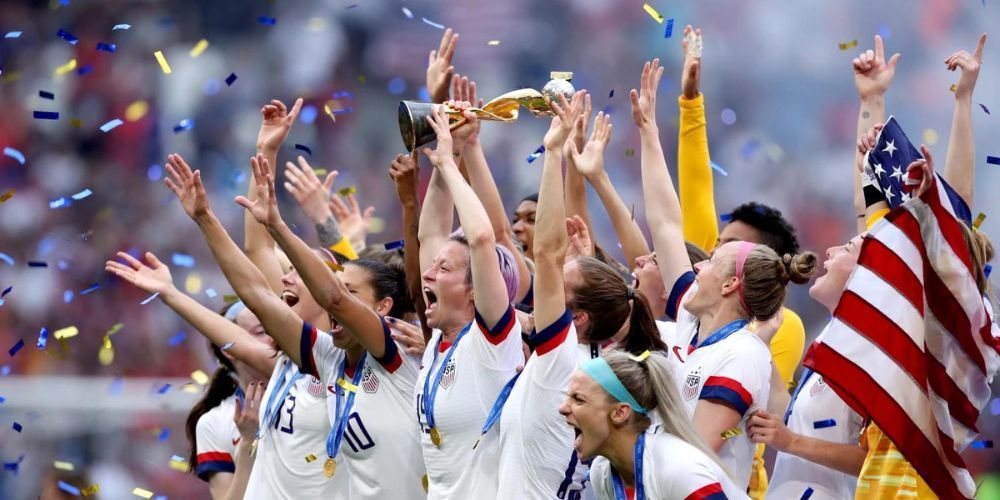Empowering Female Athletes: The Rise of Women in Soccer and their Historic Achievements
August 14, 2024
Women in soccer have achieved remarkable milestones that now shape the landscape of sports worldwide. From the first documented match in 1895 to countless battles against prejudice and exclusion, their journey is inspiring and empowering. For instance, during World War periods, while male players were away, women stepped up importantly; notably, Dick, Kerr Ladies FC drew crowds surpassing 50,000 spectators as early as 1920. This historical foundation is crucial for comprehending how women carved spaces for themselves despite significant setbacks.
In particular, teams like the United States Women’s National Team (USWNT) have become iconic figures in exemplifying resilience and excellence by securing multiple FIFA Women's World Cup titles. Their success set a precedent that motivates young girls globally to pursue their passion for soccer. Through dedicated research and gathering insightful stories of trailblazing female athletes, we spotlight how these pioneering efforts are not just stories from history but stepping stones towards continuing empowerment in sports today.
Women in soccer have achieved numerous milestones, including increased visibility through global competitions, greater representation in coaching and leadership positions, and the breaking of longstanding gender barriers. Notable players and activists have also advanced the cause of gender equality and recognition for women in soccer.

The Role of Women in Soccer Throughout History
The late 19th century was a period of enormous change and cultural evolution, witnessing the emergence of women's involvement in soccer. It was an era when societal norms were being challenged, and women began finding their voices in various spheres, including sports. The first documented women's soccer match took place in 1895 in London. The pioneering spirit of these women who dared to step onto the field during a time when such activities were considered unconventional for them is truly remarkable.
Amidst the chaos and devastation of World War I, men were called away to serve in the war, leaving gaps in the workforce and on the sports fields as well. It was during this turbulent period that women's soccer teams garnered immense attention. The Dick, Kerr Ladies FC in England is a shining example of this. In 1920, they drew crowds exceeding 50,000 spectators, showcasing the growing popularity and appeal of women's soccer.
However, it was not all smooth sailing for female players. The Football Association (FA) imposed a ban on women's soccer matches in 1921, citing that the game was "quite unsuitable for females." This ban remained in effect for an astonishing 50 years until 1971. The resilience displayed by women during this time is nothing short of extraordinary. Despite facing such institutionalized discrimination, they continued pursuing their passion relentlessly.
In the face of such adversity, female soccer players refused to be subdued. Their perseverance gradually led to significant advancements and paved the way for future generations of players. One pivotal milestone was the establishment of the Women’s Football Association (WFA) in 1969. This marked a crucial moment in history as it demonstrated a formal and organized effort towards recognizing and legitimizing women's participation in soccer.
Even amidst systematic barriers and social prejudices, the spirit of these trailblazing athletes persevered unyieldingly. Their unwavering determination did not merely carve a path for themselves but set the stage for a broader discussion on gender equality within sports—a discussion that continues to shape the landscape of women's soccer today.
As we witness the indomitable spirit and relentless pursuit of recognition by these incredible athletes, let's now shift our focus to explore the influential impact of trailblazing teams and leagues in shaping women's soccer.
Trailblazing Teams and Leagues
The power of a team lies not only in its performance on the field, but also in its ability to inspire a generation of athletes and fans. The United States Women’s National Team (USWNT) stands as a prime example, consistently showcasing remarkable skill and determination on the world stage. Their victories in the FIFA Women's World Cup in 1991, 1999, 2015, and 2019 have become landmarks in the sport, displaying unparalleled perseverance and athleticism that have captivated audiences worldwide.
These wins not only represent athletic excellence but also serve as beacons of inspiration for emerging talents across the globe. The impact of their triumphs reaches beyond the boundaries of sports, sending a powerful message of empowerment and breaking traditional gender barriers.
Moreover, the rise of prominent leagues such as the Women’s Super League (WSL) in England, National Women’s Soccer League (NWSL) in the U.S., and Division 1 Féminine in France has significantly shaped the landscape of women's soccer. These leagues not only provide a platform for top-tier talent to showcase their skills but also contribute to driving up the standards of women's football by securing improved broadcasting deals and attracting substantial sponsorships.
The enhanced level of visibility and investment in these leagues has amplified the overall appeal of women's soccer, cultivating a dedicated fanbase while opening up new avenues for female athletes. With increased coverage and financial backing, these leagues have propelled women's soccer into an era characterized by professionalism, elevating the sport to new heights.
Furthermore, they have played a pivotal role in transforming societal perceptions of women's sports, paving the way for greater gender equality in the sporting realm. The opportunities provided by these leagues have shattered stereotypes, demonstrating that women's soccer is not only relevant but also an integral part of the global sports industry.
Undoubtedly, the triumphs of trailblazing teams and the establishment of influential leagues have catalyzed a seismic shift in women's soccer, signaling a bright future for the sport on both national and international stages.

Overcoming Barriers and Achieving Milestones
The journey of women in soccer is marked by resilience and tenacity as they navigate a landscape with limited resources, unequal pay, and inadequate media representation. Despite these challenges, the resolve of female athletes has sparked remarkable progress globally. The path hasn't been without obstacles, yet the historic achievements are worth celebrating.
One of the most noteworthy moments in the history of women's soccer was the 1999 FIFA Women's World Cup. Held in the United States, this tournament became a pivotal turning point for women's soccer, capturing the hearts of millions and drawing an astonishing crowd of 90,185 fans to the final at the Rose Bowl. This event not only showcased exceptional athleticism but also shattered stereotypes and ignited unprecedented interest and support for women's soccer on a global level.
In addition to significant events such as these, a more recent development is the emergence of collective bargaining agreements in leagues like the National Women's Soccer League (NWSL). These agreements represent a critical stride forward in addressing issues of unequal pay and providing better support for female athletes. Furthermore, initiatives like UEFA's #WePlayStrong campaign serve as beacons of empowerment, highlighting ongoing efforts to elevate the visibility and recognition of women in soccer.
The past few decades have also seen a surge in advocacy and support for female athletes from various social and political movements. The feminist waves of the 1960s and 1970s played a pivotal role, standing in solidarity with female athletes and advocating for gender equality in sports. Their tireless efforts have paved the way for today's generation of women in soccer, fostering an environment where their talents are celebrated and recognized on a global stage.
It is evident that while there have been significant strides in the world of women's soccer, there are still obstacles that need to be addressed. Let's explore how female athletes are transcending these challenges through their dedication and determination.

Celebrated Contributions of Women Players
In soccer's rich tapestry, certain individuals have left an indelible mark on the sport. Take Mia Hamm, a trailblazer in women's soccer, who made headlines with her impressive record of 158 international goals, leading the United States National Team to multiple triumphs. Her prowess on the field fueled her own success and galvanized a generation of young athletes who aspired to follow in her footsteps.
And then there's Marta Vieira da Silva, commonly known as Marta, who has earned the title of FIFA World Player of the Year six times. Her unparalleled skill and sportsmanship have solidified her as a revered figure in women's soccer while transcending national borders. Her magnetic presence and exceptional performance have played a pivotal role in elevating the profile of women's soccer globally, opening doors for players from all corners of the world.
It's not just about achieving milestones on the field; these players have utilized their influence to advocate for social change. Megan Rapinoe, a contemporary icon in women's soccer, has been an influential advocate for gender equality and LGBTQ+ rights. Her passionate stance on equal pay for women athletes has resonated far beyond the confines of soccer fields, highlighting the profound impact sports can have on societal progress. Rapinoe and players like her are amplifying their voices to bring about positive change, paving the way for greater inclusivity in sports.
These remarkable players are not just names etched in history books; they are embodiments of courage, resilience, and determination. Their journey on and off the field serves as an inspiration for aspiring female athletes worldwide.
"The player that has no passion or desire is not worthy of wearing the shirt." - Mia Hamm
As we explore deeper into the captivating world of women's soccer, it becomes evident that these athletes are not just athletes; they are agents of change, empowering individuals across generations and breaking down barriers along the way.
Advancing Recognition and Equality
In recent years, a noticeable movement has emerged to level the playing field for female athletes, particularly in the fiercely competitive world of soccer. A pivotal moment in this pursuit was the USWNT's 2019 lawsuit against the US Soccer Federation, which highlighted the discrepancies in pay and working conditions between male and female players. This high-profile case brought attention to the issue and started significant conversations about gender discrimination in sports.
Further strides have been made by FIFA in announcing an increase in prize money for women's competitions. This is a tangible step towards acknowledging the talent and effort of female athletes on a global scale. Moreover, media coverage of women's games has seen a gradual improvement, with prominent networks like BBC and ESPN broadcasting women’s leagues, reaching wider audiences and giving these athletes the spotlight they deserve.
Initiatives such as Equal Playing Field have been instrumental in advocating for gender equality in sports worldwide. By creating platforms for female players to showcase their skills and cementing their presence in the sporting landscape, these endeavors are essential in breaking down barriers and pushing for systemic change.
For instance, Equal Playing Field has organized events across countries to set astonishing world records, like the highest altitude game ever played, thus showcasing the limitless potential of women in sports. These efforts contribute not only to awareness but also inspire the next generation of female athletes to dream big and pursue their passions without constraints.
While progress has undeniably been made, there is still much ground to cover before equitable conditions become the norm rather than an exception. Thus, it becomes imperative for institutions, organizations, and individuals alike to stand behind these efforts and actively work towards a future where recognition and equality are unequivocally woven into the fabric of sports culture.
With momentum building to redefine the landscape of women's soccer, it's time to dive into the stories of inspiring pioneers and unforgettable moments that have shaped this transformative journey.
Pioneering Figures and Iconic Moments
Remarkable pioneers and unforgettable moments have propelled women's soccer forward, leaving an indelible mark on the sport. These individuals and events are synonymous with resilience, passion, and achievement, contributing to the rich tapestry of women's soccer history.
One such trailblazer is Lily Parr, a legendary figure whose impact on women's soccer is immeasurable. Playing in over 1000 matches for Dick, Kerr’s Ladies, Parr defied societal norms, capturing the hearts of fans worldwide with her exceptional skill and unwavering dedication to the sport. Her enduring legacy continues to inspire countless female athletes to this day, serving as a testament to her unparalleled influence on women's soccer.
In the realm of coaching, Pia Sundhage stands out as a trailblazing figure who etched her name in the annals of women's soccer history. Sundhage's illustrious career saw her lead both the US and Sweden national teams with unparalleled success, showcasing her tactical prowess, leadership acumen, and unwavering commitment to advancing the sport. Her contributions have paved the way for future generations of coaches, embodying the spirit of empowerment and excellence in women's soccer.
On the grand stage of iconic moments, few events rival the USWNT’s unforgettable victory in the 1999 World Cup. This triumph not only captivated a global audience but also served as a defining moment in women's sports history. The image of Brandi Chastain's historic celebration following her championship-winning penalty kick remains ingrained in the collective memory of fans, symbolizing the culmination of perseverance, teamwork, and unyielding determination.
Much like works of art displayed in a gallery, these iconic moments in women’s soccer tell compelling stories that resonate across generations. They encapsulate moments of triumph, resilience, and unity that transcend the boundaries of time and space.
Moreover, Ada Hegerberg's groundbreaking achievement as the inaugural winner of the Ballon d'Or Féminin in 2018 marked a monumental milestone for women's soccer. Her unwavering dedication and exceptional talent shattered barriers and reshaped perceptions, cementing her status as an emblem of empowerment for female athletes around the world.
From pioneering figures who blazed trails against all odds to iconic moments that reverberate through time, these narratives embody the enduring spirit and resilience that define women's soccer. As we explore these tales of triumph and perseverance, it becomes evident that their lasting legacy serves as a guiding light for future generations of female athletes striving for excellence in the world of soccer.
As these trailblazing stories continue to shape the landscape of women's soccer, it's crucial to look ahead at what the future holds for female athletes in this dynamic sport.
Future Prospects in Women's Soccer
Women's soccer has come a long way, and it's just getting started. FIFA, recognizing the potential and power of women in football, has laid out an ambitious strategy aimed at doubling the number of female players by 2026. This is more than just a numerical target; it represents a commitment to nurturing talent, fostering passion, and advocating for equal opportunities both on and off the pitch.
One of the most impactful ways to secure the future of women's soccer is by investing in grassroots programs. By providing young girls with access to high-quality coaching, facilities, and resources, we can cultivate a new generation of talented players who are ready to take on the world stage. These programs not only develop athletic skills but also instill values of teamwork, discipline, and leadership that extend far beyond the field.
Increased visibility through media partnerships is another crucial aspect of shaping the future of women's soccer. When young girls see their role models and heroes on television, in magazines, and across social media platforms, it ignites a sense of possibility and inspiration. Media coverage not only amplifies the reach of the sport but also sends a powerful message about the value and respect for women in athletics.
Advocacy for equal resources is an ongoing battle that continues to define the landscape of women's sports. From equitable pay to access to top-tier training facilities, the fight for parity is integral to sustaining growth in women's soccer. It's about dismantling barriers and creating environments where female athletes have everything they need to succeed.
Advancements in Technology and Analytics
Looking ahead, advancements in technology and analytics are poised to revolutionize women's soccer. The integration of cutting-edge tools for performance analysis, injury prevention, and player development will not only enhance the quality of the game but also draw increased investment and global interest.
For instance, wearable technologies that track player movement, heart rate, and other physiological metrics can provide invaluable insights into training optimization and injury risk management. This data-driven approach ensures that athletes receive personalized attention and care, ultimately improving their overall well-being and performance on the field.
Furthermore, analytics play a pivotal role in scouting talent, strategic game planning, and refining individual skills. By embracing these technological innovations, women's soccer stands to gain substantial momentum in attracting talent, engaging fans, and cementing its status as a dynamic force within the sports industry.
The future of women's soccer is bright with initiatives driving progress at every level. As strides are made towards achieving inclusivity, accessibility, and innovation, we can anticipate a vibrant landscape that empowers female athletes to realize their full potential on the global stage.
The future of women's soccer holds immense promise as it continues to break barriers and harness innovative solutions for growth. The journey ahead is filled with anticipation and excitement as empowered female athletes pave their way to success.
How has women’s soccer evolved over the years?
Women’s soccer has experienced remarkable growth and transformation over the past century. Initially, women faced significant barriers, including societal norms and lack of institutional support, which limited their opportunities to play and compete. The first recorded women’s soccer match took place in the late 19th century in Scotland, but it wasn’t until the mid-20th century that the sport began to gain more formal recognition.
In 1970, the first unofficial Women’s World Cup was held in Italy, signaling a turning point for the sport. The introduction of Title IX in the United States in 1972 provided a significant boost, mandating gender equality in educational programs, including sports. This led to increased participation and funding for women’s soccer in schools and colleges.
The establishment of the FIFA Women’s World Cup in 1991 and the inclusion of women’s soccer in the Olympics in 1996 were pivotal moments that elevated the sport’s profile globally. These events provided a platform for female athletes to showcase their talent and inspired generations of young girls to pursue soccer.
Today, women’s soccer continues to flourish, with professional leagues in various countries and growing viewership for major tournaments. The sport’s evolution reflects broader societal changes toward gender equality and the recognition of women’s contributions to sports.
Who are some of the most influential female soccer players in history?
Several female soccer players have made significant contributions to the sport, inspiring future generations with their talent and achievements:
Mia Hamm: A trailblazer in women’s soccer, Mia Hamm is one of the most celebrated players in history. As a forward for the U.S. Women’s National Team, she won two FIFA Women’s World Cups and two Olympic gold medals. Hamm’s skill, leadership, and influence helped popularize women’s soccer globally.
Marta Vieira da Silva: Known simply as Marta, the Brazilian forward is widely regarded as one of the greatest female soccer players of all time. With numerous awards, including the FIFA World Player of the Year, Marta has been a dominant force in international soccer and an advocate for women’s sports.
Birgit Prinz: A former German striker, Birgit Prinz is a three-time FIFA World Player of the Year and played a crucial role in Germany’s success in women’s soccer. Her achievements include winning the FIFA Women’s World Cup twice and multiple European Championships.
Abby Wambach: Known for her powerful heading ability, Abby Wambach is one of the all-time leading goal scorers in international soccer. She played a vital role in the U.S. team’s success, winning a World Cup and two Olympic gold medals. Wambach has been a vocal advocate for gender equality and LGBTQ+ rights.
These players, among others, have paved the way for future female athletes, breaking barriers and inspiring millions worldwide.
What challenges have women faced in soccer, and how have they overcome them?
Women in soccer have faced numerous challenges, including gender discrimination, lack of funding, and limited opportunities compared to their male counterparts. Historically, women were discouraged from playing soccer due to societal norms that viewed the sport as unsuitable for females. Even when women formed teams, they often struggled to gain support from governing bodies and the public.
Despite these obstacles, women have persevered and fought for equality in soccer. The implementation of Title IX in the U.S. was a significant step forward, ensuring equal opportunities for women in sports. Advocacy by female players, coaches, and supporters has also played a crucial role in challenging stereotypes and demanding change.
The formation of professional women’s leagues and increased media coverage have helped raise the profile of women’s soccer. Organizations like FIFA have taken steps to promote and invest in the women’s game, although disparities still exist.
Women soccer players have also used their platforms to advocate for social change, addressing issues such as pay equity and gender equality. Their resilience and determination continue to inspire progress, ensuring that future generations of female athletes have greater opportunities to thrive in soccer.
Check out the latest guides on soccer
Author: William Flaiz










